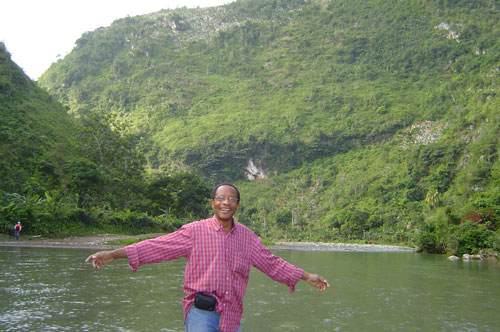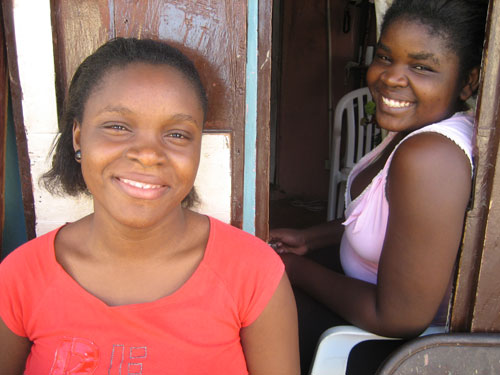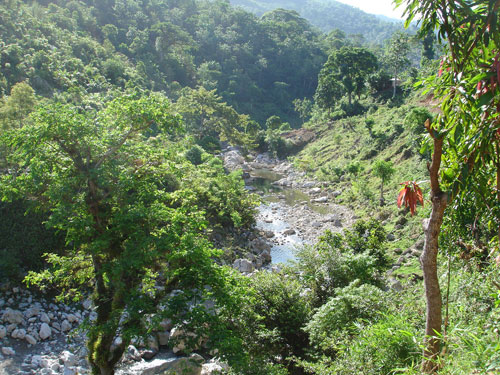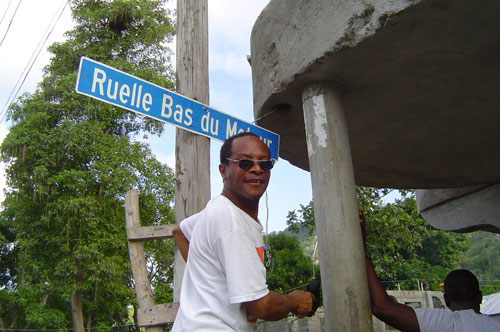
Being asked to interview TiGeorges is a bit like being asked to eat at his restaurant-- something I would gladly do anyway, and something that is sure to leave me with some new pieces of wisdom and insight. A lot has been happening in Haiti even before the earthquake, and now as Haiti is in the international eye much more is being said and written. "Kreyol pale Kreyol kompran" goes the proverb-- Kreyol spoken is Kreyol understood-- and one of the many meanings of this proverb is that those native to Haiti are the ones who are truly qualified to speak about it. With that in mind, I sat down to talk to TiGeorges LaGuerre, the proprietor of TiGeorges Chicken (in Echo Park) and the man who not only introduced me to Haiti, but also taught me to speak Kreyol.

TiGeorges LaGuerre
CULTURE
Tom McNalley: As two people who have traveled around the world, we always talk about how a culture manifests itself for the visitor in its art/music and in its food. As a chef, how does Haiti show itself in its cuisine?
TiGeorges Laguerre: Well, Haiti has a most complex cuisine-- one because Haiti was colonized by both the Spaniards and the French, and being African, we mix those things together. So Haitian cuisine can be very difficult to analyze, because there are so many influences. But that mixture makes Haitian cooking the truly Creole cuisine.
TM: They also do a lot with relatively few ingredients..
GL: Well, people always say that Haiti is the poorest country this and that, but in cuisine we really take care of business-- you could go to the bottom of the barrel in Haiti and you will still have a great meal. As a matter of fact, I grew up on sidewalk cuisine-- my grandmother used to cook food so well that all the Europeans used to come eat her food, and eventually they asked her to come and cook for them, which basically how my family life started to be built up from poverty into having some money, through my grandmother's cooking over 100 years ago. And then my mother continued that.
TM: And you're doing it here in Los Angeles
GL: That's right. We take food very seriously in Haiti! We don't eat just to fill up the stomach-- we eat because we want to enjoy something good and have the pleasure of each others company. That's what Haitian cuisine is truly all about.
TM: When we're in Haiti we usually only eat one meal a day-- I don't really notice until I get back to the States and am eating more than that, but maybe you have an avocado or an orange in the morning, but mainly you are eating one small meal at about 4 or 5 in the evening, and that is enough.
GL: Well, like I said, its the idea of eating something of quality, and Haiti is well known for that. Even the fruits and vegetables, they are naturally grown. We do not use fertilizers or chemicals, and therefore when you eat something in Haiti, you do not have to eat a large portion of it to be satisfied.
TM: It's like what Remy said in Anse-a-Foleur: Americans are so crazy about organic this and that and all Haiti uses to grow its food is sun and rain! (laughs)
GL: That is correct-- so cuisine is like the backbone of the culture!
TM: One thing that ties the cuisine to other aspects of Haitian culture is the level of creativity involved-- art, music, you name it-- but the very idea of creativity is highly valued in Haiti.
GL: Creativity comes about in a society that has very little-- you see these kids who take a plastic container and make a toy car-- and they will use every piece of that container to make the car. It's free, nothing is going to waste-- low tech at its highest level, and yet, the creativity. Because someone truly has to be a thinker-- and Haitians are thinkers. We want to make sure, I don't know if its a good thing sometimes, because what happens is that we want to make sure before we jump-- we're not going to jump until we're certain, because we don't want to deal with failure, the negativity that comes with it-- that could be a bigger pill to swallow! Like with homework, we're going to pass the information along to Jerry, or a couple of other guys, so three or four people will have access to the information before it is submitted to the principal-- to make sure that it is correct.
TM: It makes for a very philosophical society, too. I mean, you and I know guys who live on a mountain in the middle of nowhere who can't even read or write, but have wisdom beyond wisdom-- you could bring them any problem and they could solve it.
GL: (laughs) Ooohhh yeah! As a matter of fact, if you really need to solve a problem in Haiti, go check out a peasant. That guy will give you wisdom that in your wildest imagination-- I swear, you could have a PhD and his answer will make it look like nothing! It's a sad thing that that guy cannot read and write, and he pays a very expensive price for it-- peasants are the majority, but the minority (meaning the elite class) somehow muffles it. Like they do everything in writing and in French, and the peasants do not speak French or read, so it's almost like they are torturing the peasants with French. I think this is definitely one of the biggest problems that has to be solved in Haiti-- Kreyol needs to be put in the forefront. It is a good thing to speak French, it is a good thing to speak Spanish, it is a good thing to speak English-- but Kreyol is truly the native tongue of Haiti. And this has been abandoned in the political landscape since day one! But the peasant is the one who has the wisdom.
And guess what? It's the peasant who cultivates the land. He is the guy who is going to bring food to your table-- but the guy who is speaking French, or enforcing the French, makes the peasant feel so embarrassed, so intimidated, so ashamed of who he is that he tries to move to the city and mingle with the French speakers-- this is the failure of Haiti also, because the guy who should be cultivating the land is in the city. And I'm not saying the quake is a good thing it was a very bad thing, but it did serve as a wake up call and now a lot of the peasants are returning back to their land. But those peasants provided a service-- and they are the backbone of the society. But when you leave the mountain and try to mingle in the city and you can't read, can't write, well how the hell are you going to function in a society that operates on those things? It's not going to happen. But when they return to their land and cultivate it, that is what is going to move Haiti to the next level.
TM: And at the same time, we're seeing reports of people being pulled out of the rubble six, seven days later and they're still alive-- this is the blood of the peasants-- survival.
GL: Definitely. These are people who have endured injustice, intimidation, they have been embarrassed on all possible levels and yet these are the people that have the strength, stamina and determination to move forward. And the government of Haiti has truly neglected its peasants. Like Edna (Delvarais, a mutual friend who lives in Port-au-Prince), she told me "Don't worry about me, I can manage my hunger for five days." In Haiti I know people who for sure only have 10 meals per month, and you wonder how they go about the every day, keeping their heads up and everything else.
TM: And you won't ever hear them complain.
GL: Haitians are not complainers. What is really required to satisfy us is so minimal-- we look for the small things, that is the mindset.
TM: It's even in the language, like Dayanna (Georges' cousin in Port-de-Paix and a good friend of mine) was explaining-- when someone asks how you are doing, you say, "N'ap Boule," "M'ap kampe"..
GL: Yeah, we're standing up, things are good..
TM: But if your house just burned down, both your legs are broken and your family has all died, then you would use, "Pa pi mal" ("Not too bad").
GL: Well yeah, because you're still alive. You know, even me, living in America all these years, there are certain things that have been disconnected. But I go to Haiti and hear Haitians using certain terms, and sometimes I try to undo that-- are you sure you want to accept and tolerate all that? And I think the international community takes advantage of that-- they tend to view Haitians as weak people, whatever they can feed us is acceptable-- but the Haitian will not complain in public. Behind closed doors, when he goes to bed and he is meditating, thats when he's going to say "look what so-and-so did to me". But he will never fight or go and show that he was disappointed with what was said or what was done to him.
TM: It's like any gift, no matter what, will be taken with humility, love and graciousness-- that is one line you don't cross.
GL: Definitely. Definitely.
FAMILY

TM: Another thing that a lot of people don't know about is the role of women in Haitian society. Could you talk about what you might call the Haitian Feminism?
GL: Well, I can talk about my grandmother and my mother, because most of the education that I received came from them. Women in Haiti run Haiti-- you may not see them in the forefront, but when you really need something to get done, you'd better call a woman. I'm not putting Haitian men down, but their tendency towards that sort of macho behavior-- he is the man, is job is to provide economically and that's it-- the power is with the women.
I always put my grandmother in the forefront. She taught me so many things, including how to cook. It is because of her that I opened TiGeorges Chicken, because she said that when life gets difficult, you need to go back to your roots.
My mother is a nurse, she is a mother of 10 kids, a merchant and still conducting business at the age of 90, she's a hard working person! She is the person that always made sure that money was in the house. And I can truly call my mother the iron fist. I remember something my mother had done, back in the 60's, I don't know if anybody could have those guts, the nerve and the audacity to do-- only my mother could do that.
During the Duvalier years we had the Tonton Macoutes, they had more power than they would ever need to run the country. But there was this guy who had a Tap Tap bus that went from Port-de-Paix to San Louis du Nord. It was a 1955 Chevrolet flat bed, and he had really made it look nice, like it was brand new again. That was a nice piece of machinery! So one morning the chief of police (a Macoute) says to him "I want to drive this car," and he says "Over my dead body, you ain't gonna drive that car!" So the Chief of Police was so embarrassed, he took him to jail and started beating the crap out of this guy, from like eight o'clock in the morning until about 2pm, like torture, you know. And my mother heard about this, and she walks into that jail, pulled that guy out and said "you are all a bunch of criminals."
It took me years to understand why my mother was able to do that. My mother has a book that has the name of probably 75% of the people in Port-de-Paix, and in some form they all owed her money. Guess what? She never collected, never harassed them for it but I guess she used that and that's how she gained power in town. For her to walk into that jail cell and basically save that guy's life-- well, no one ever said anything about it. That's the kind of woman my mother is, gutsy and with an iron fist!
TM: And your father?
GL: It is because of him that I am involved in coffee-- he was the director of customs, but when Duvalier came to power, you know when governments change, everything changes? Well he was no longer director of customs. So he went to Anse-a-Foleur and began to grow coffee there. My father would be very proud of me right now for having continued his work and to see what has happened in terms of the growth of that town.
TM: Would you talk a little bit about your coffee operation?
GL: Like I said, my dad would be very happy to see me going into the deepest part of Haiti to bring coffee back. We still have more work to do, but the product is such a great product and in terms of Haiti it has been neglected. So I'm trying to put Haitian coffee back into the world market, and hopefully in the next couple of years Haiti will be up there competing with all of the other coffee producers.

TM: You really have a strong relationship with the people there too.
GL: Oh yeah, I'm not interesting in taking their coffee and then just keep moving. No. I'm not in the business of dictating to them how they should grow or do anything like that. It's been 300 years, they should know how to grow coffee. It would be very disrespectful for me to go and coach Haitian coffee growers! But they are my friends, and I like to help them wherever I can, whether it is with tools or whatever they need. But I do not promote the idea of giving money for free, I am more interested in giving the tools and resources and business that they need to elevate themselves. And they do it, too. The people living on that mountain are not starving, because they are cultivating the land.
EARTHQUAKE
TM: One thing that Haitians are talking about but not many others is the impact of the earthquake in terms of the class barrier-- nobody will sleep indoors, so the rich and poor are both sleeping in the streets. We were just talking about the peasants and the elites, can this leveling bring about a new unity in Haitian society?
GL: Well, one thing that is happening which is a very bad thing is with all these people who have died and are dying, they are being put in mass graves. All of them. Rich, poor, Catholic, Protestant, Vodou, foreigner, MINUSTAH, they are all buried together. I do not know what the impact of this will be on the society, I do not think anyone will truly know for many more years, but it is a very bad thing on all possible levels. Do you think we are going to excavate those mass graves? I don't think so. The bodies have deteriorated already. Also people are always saying that Haiti is the poorest country, and full of the worst diseases-- and yet we are finding out that there are a lot of foreigners in Haiti-- they are in these mass graves too-- so maybe we need to ask what they were doing in Haiti if they think it is so bad. Or else banish the idea altogether, because either they simply loved Haiti and living there was great, or they had some kind of business there, or something else good was keeping them there. Nobody can identify their loved ones-- so Haitians are mixed with everybody else. With all these people buried together maybe it will put a stop to the divisions that exist in our society. It goes beyond rich and poor.
TM: And how about the survivors, moving forward?
GL: Oh yes, there will be more unity, but it will not be as fast as people would like. Haitians are still reluctant to give up what little they have-- whatever class they are. And that is actually a strength of Haiti, because it has helped to keep a lot of international forces at bay, but in this case it will mean taking more time than we might like.
TM: A lot of people want to help but don't know how. What is your advice?
GL: Anyone who wants to help Haiti needs to make some serious preparations. You cannot truly help Haiti without knowing the people and how we live. This means you need to speak some Kreyol, and learn the values of the Haitian people. You cannot come here and try to enforce your values when you do not even know the values of the people-- and they already know your values! But Haitians are crying for people to know their values. How can someone who does not speak one word of Kreyol understand the way our society functions? We do not operate like the western world, we operate like Haiti. And yet people want to come in and change the way we do things without understanding why things are that way.
A lot of doors are shut for Haiti, and Haiti can never be Haiti. It is very sad, at the international level we are not invited to participate in a lot of things. Cuba, Dominican and Puerto Rico get together but they do not invite Haiti-- we buy their products, but they do not buy ours, and how do you advance a society like that? For the past 200 years we have been trying to deal with the debt that France gave us after our independence, but we cannot do it alone. People may look at Haiti and say that we have no government, but that is a false statement. Among the people, we have government.
TM: Speaking of which, there is talk of either Prime Minister Louis or Aristide himself returning to Haiti. What is your take on that?
GL: Well, I don't know. The problems of Haiti right now are so complex, and I am not a politician-- I don't think I am equipped to understand their views. When Aristide came to Haiti and was the first president to win an election with 90% of the country behind him, I took such a great pride as a Haitian living abroad. I said to myself, at last Haiti has a chance! He was the first president to truly start speaking Kreyol and he really embraced the peasants. But on another political level, I don't know if his return would be a good thing for the country, I can't really comment on that.
TM: Rush Limbaugh said earlier in the week that he didn't think that the United States should be helping Haiti. In your mind, what kind of help should Haiti be sending Rush Limbaugh?
(laughs)
GL: Well I don't think Rush Limbaugh is equipped to help Haiti. If you're going to help someone, you have to know what they are about. Someone like him, I doubt if he speaks a word of Kreyol or if he has ever been to Haiti. Without that knowledge, you could have a billion dollars and not be in any position to help. He makes his money by using fear and belittling people, and I am quite sure that he will continue on that road.
TM: According to people in Port-au-Prince, most notably Amy Goodman and Richard Morse via Twitter (not to mention the people actually living in those neighborhoods), aid (via the US military and the UN) is not getting to areas like Carrefour and other "poorer" neighborhoods. Some say it is on purpose, some say it is because of logistical problems. Do you think there is an underlying reason?
GL: I will say this: At my age, 56 years old, I cannot recall a time when help had been delivered to Haiti and that help had not been broken. Meaning that the people giving to Haiti did not have Haiti at heart-- just helping for publicity, or that money had to pass through too many hands or something. There are always strings attached, which is part of the reason that Haiti is still in the condition that its in. How are you going to have the hundreds of billions of dollars that have been poured into the country over the years and the country still looks like that? Like I said, if you are going to help Haiti, you have to know the country. Anyone who does not know the people could not deliver excellence. When you get to the nitty gritty of helping people, you will be excluded if you cannot communicate with them. If there is a breakdown in communication, then your presence is not needed. Go and make yourself acquainted with the people of Haiti, they will guarantee your education!
You know, it's like that first time when we went to Haiti together, and we were at the airport coming home. The lady who checked you in spoke to you in English, and you responded in Kreyol to her. By the time it was my turn, she was in tears. I asked her what was wrong and she said that all day long she checks in foreigners, whether they are missionaries, MINUSTAH or whatever, people who have been here for a long time, maybe even years-- and here was this white guy from America who spoke to her in her own language. That probably had more impact than most of the aid coming to Haiti, and I'm sure everyone she knows heard about that.
Being at the restaurant I have seen over the last couple of years and especially since the earthquake a large number of Americans who come with an interest in Haiti and they are learning to speak the language. This is what can truly help my people, because guess what-- these people are going to go to my country, and get to know my people, and they will see the beauty of Haiti. Then so many of the lies that have been told about Haiti will be corrected by people who went to see it for themselves.

TM: How about rebuilding efforts in Port-au-Prince, Leogane and Jacmel and other cities that have been destroyed?
GL: What I am hearing about Port-au-Prince is that maybe they will start from ground zero somewhere else-- new palace, new city hall, new everything-- with infrastructure and everything. Create a new town, and in Port-au-Prince where there were buildings, demolish them and make public parks as a reminder of what happened there. Buildings that are still there can stay, but public domain areas.
TM: Like the Dunham Botanical gardens? Something that is both ecologically restorative and a public area?
GL: Exactly. That is what I am hearing, I do not know what they will do. But I do know that this idea is a very expensive proposition. But with those gardens, you're going to bring trees, birds, all these things, and it would be a very good thing.